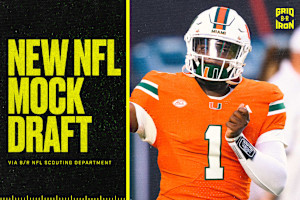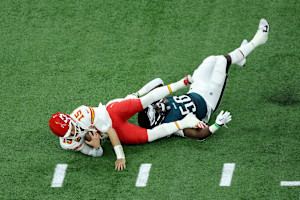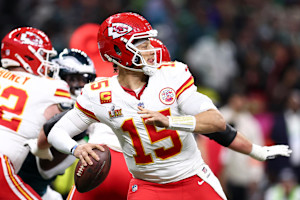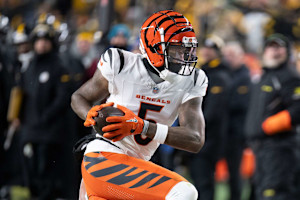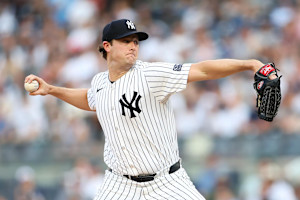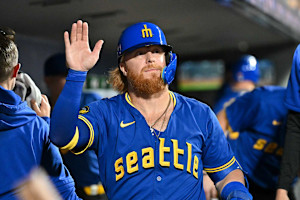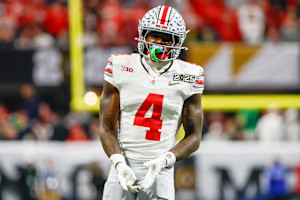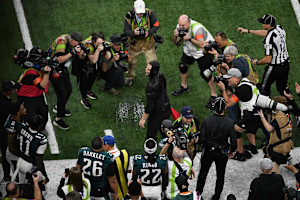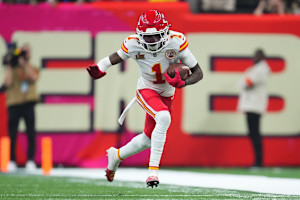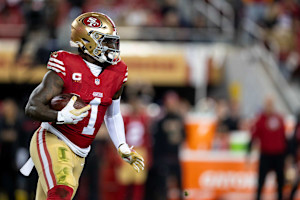No Mickey Mouse Keeper—How Alisson Becker Became One of the World's Best
August 20, 2018
A trip to Disney World in Orlando, Florida, is almost a rite of passage for middle- and upper-class Brazilians. It's a dream destination, especially for kids. But as Liverpool's new goalkeeper Alisson Becker might tell you, grown-ups can be fans, too.
The man now worth £65 million was still fighting for a place in the Internacional first team when he got married in 2015. Alisson and his new wife, Natalia Loewe, thought there was no better place to spend their honeymoon than with Mickey and friends.
However, it was also there, while waiting in line to get into one of the theme parks, that Alisson found out his name could be received differently if he ever had to play in the English-speaking world.
"Princess Alisson," a cast member called out for him on the loudspeaker.
He couldn't believe it. Alisson is a male name in Brazil. The former AS Roma goalkeeper was so embarrassed he made Loewe swear no one else would hear about it.
But after he got over his bashfulness, he told the anecdote on a TV talk show in his homeland and joked he would have his last name on the back of his shirt if he ever left Brazil.
A #princessalisson hashtag was promptly started on Twitter in Brazil after his appearance.
The "Becker 13" goalkeeper shirt is now on sale at the club shop at Liverpool. After an outstanding season with Roma, conceding just 28 goals in 37 games, he's looking forward to ruling between the posts in the Premier League.

Liverpool beat Real Madrid and Chelsea in the race to land Alisson this summer for what was briefly a world-record fee for a goalkeeper until Kepa Arrizabalaga joined Chelsea. The Reds will be hoping the large outlay will end their long-standing issues at the position.
However, the Brazilian could have arrived at Anfield almost a decade ago.
Daniel Pavan is Internacional's goalkeeping coach and has been cited as a mentor by Alisson. The duo worked together for eight seasons at the Porto Alegre-based outlet.
"Alisson to Liverpool is a longtime affair," Pavan told Bleacher Report. "I remember that he was still very young when Liverpool showed interest in taking him. He was Brazil's first-choice keeper at the U-17 World Cup [in 2009] and had drawn attention from foreign scouts. We then heard inside the club that Liverpool were among those to have inquired about him."
No offer for Alisson was ever accepted.
Instead, he stayed at Inter and quickly rose up the ranks to become the club's regular keeper at the age of 22.
His progress never slowed. A year later, he was wearing the captain's armband. Fast-forward another 12 months, and he was already featuring for Brazil in a classico vs. rivals Argentina. Alisson is still only 25, but sometimes he seems much older.
One of his strongest advocates has always been Brazil's goalkeeper coach and 1994 FIFA World Cup winner Claudio Taffarel.
Taffarel's own story has helped Alisson achieve such quick acceptance in Europe. The former Parma, Reggiana and Galatasaray man was responsible for opening doors for Brazilian goalkeepers. He had to listen over and over to cries that Brazil could not produce world-class goalkeepers and that he and his compatriots were "frangueiros" (chicken men).
"In the '90s, it was not common for a Brazilian goalkeeper to come and play in Europe. We were not really rated; in a way we were treated almost like a joke," Taffarel said. "Dida and Julio Cesar have also done a very good job. If nothing changes, the doors will remain open for others to prove their value."
Alisson is the next in line to try to ensure Taffarel's hard work was not in vain.

A few days before Brazil's World Cup opener against Switzerland this summer, Alisson attended a press conference in Sochi, Russia. The room was packed with reporters and camera crews expecting him to announce his new club.
Odd queries can come up at World Cup press conferences, and around the end of the interview, Alisson was asked if he was worried about the redness of his face.
"It doesn't bother me—it's part of the game. I'm in puberty," he replied, laughing at his acne.
He is used to taking questions about his looks in any interview but usually for other reasons. He's known as "goleiro gato" (handsome goalkeeper) and has been teased about it by his own managers.
"One of his former coaches [at Internacional], Argel [Fucks], seldom called him by his name during the games," Pavan said. "When he wanted to give some instruction, he would shout 'muso' [the muse] to get his attention. It was, 'Muso, do this, do that,' never Alisson."
Back in Brazil, Alisson has refused invitations to model because he was afraid it would get him off-the-field headlines and harm his performances on the field.
While he has garnered nothing but positive headlines in Europe, opinions of Alisson have been more mixed in his homeland.
When Brazil's then-coach Dunga chose him as starting keeper in 2015, to replace Botafogo's veteran man Jefferson, he had only just turned 23. The decision was initially heavily condemned in the country.
A leading pundit for broadcaster Bandeirantes, Neto has been a fierce voice against Alisson's presence in the national team. The former Brazil international is among those who have suggested the goalie's prestige with the coaching staff is more down to his blue eyes than his shot-stopping ability.
He predicted before the World Cup that if boss Tite stuck with Alisson, he would not win the trophy and "have to drink three bottles of vodka on the return flight."
Alisson defended himself and his rise in an interview with Brazilian outlet SporTV (h/t UOL) earlier this year.
"I've got here because I deserved it," he said. "I worked really hard in the training sessions. If I was playing, it's because Dunga trusted me. I didn't start playing because I was handsome, he liked me or Taffarel liked me."

Taffarel continues to be one of Alisson's biggest supporters. Both of them are from Rio Grande do Sul and began at Internacional, and they have a relationship that goes far beyond the pitch.
"We get along really well; he has a very good character; he's a nice companion," Taffarel said. "Our families have an excellent relationship. Whenever we meet in Porto Alegre, we do barbecue together and go to the country house. But it has no influence in the national team; we leave this apart."
Pavan believes Alisson would be treated differently if he had come from one of the more celebrated Sao Paulo- or Rio de Janeiro-based sides.
"The media from the centre of Brazil started questioning him. However, they do not mention that despite being still young when he was first called up, he had already been decisive in our Copa Libertadores campaign [in 2015]," he said.
The reviews improved for Alisson after he moved to Italy. He had to ask Sky Italia pundits to drop the comparisons with England legend Gordon Banks after he stopped a certain goal against Bologna last season, while Roma coach Eusebio di Francesco described him as the "goalkeeper of the future."
One aspect of his game that is being increasingly appreciated is his ability with his feet. Those who have worked with him often cite his comfort on the ball as a strength. As Dunga concluded after bringing him into the Brazil squad, "When Alisson runs to the ball, he thinks like a striker—where he will shoot, how he will do."
One back-heel pass Alisson made against SPAL last season went viral, and he has been called "goleiro-atacante" (striker-keeper).
The moniker "Pele of goalkeeping" was even attached to him after it was wrongly claimed that Taffarel had called him that.
"Those words never came out of my mouth," Taffarel said. "I would never say that in respect to other keepers, especially the ones I work with in the national team. Goalkeeping is a position that you need to have your feet on the ground. When we mention Pele, we're talking about a very high level, and I think that a goalkeeper needs to be always humble, work a lot and do his best.
"What I have always said is that Alisson is a step above the others because of his behavior, attitude and technique. Saying he's 'Pele of goalkeepers' is too much. I've always appreciated his playing style, the calmness he brings to his colleagues and the coaching staff."
He may have the skills to showboat, but those hoping to see a flashy goalkeeper in the Premier League this season are likely to be disappointed.
"He's not one of these goalies that you would describe as eccentric and theatrical," said Jorge Andrade, Internacional's academy executive director. "He's not a 'voador' [flying keeper]. He comes from our goalkeeping school—instead of doing acrobatic saves, he will be in the right position to cover a large portion of the goal. He's brilliant on and off the pitch. He became a leader in a dressing room."

Being compared to Taffarel is the highest compliment a Brazilian keeper can ever receive, especially if he's from Inter, but Alisson is on track to match and perhaps even better the career of his idol.
"He's very reserved, but you could see he would go on to become a great goalie, perhaps one of the best to ever feature for Inter, really close to what Taffarel achieved in his career," said Dorival Junior, who worked as his coach from 2011 to 2012.
It's been a meteoric rise for Alisson but one that appeared unlikely when he was a kid.
His brother, Muriel Becker, who is nearly six years older, was the first of the two to make it to Inter. Alisson joined when he was 10 on the recommendation of his brother, but he struggled with his weight and height and sometimes did not even sit on the bench.
He was a "half-pint keeper," much shorter than the others, and a bit chubbier. His parents wanted him to abandon the team and stick with school.
"In their minds, he had no future in football. They had pinned all the hopes on Muriel," said Pavan, who had to persuade the Beckers to continue sending Alisson to training. "I explained to them that he had a slower maturation than his colleagues—on a scale of one to five, he was level one—but technically he was more talented. They ended up listening to me. Then, over the course of a year-and-a-half, he grew 17 centimeters [6.7 inches], lost weight and never looked back."
When it comes to sports in the Becker family, goalkeeping runs in their blood.
Besides Muriel, who plays for Belenenses in Portugal, Alisson's father, Jose, had the same role in pickup matches with friends, while his mother, Magali, was a handball keeper. Even his great-grandfather also played in goal. Alisson was destined to follow.

Muriel was the first to make the Internacional first team, but he knew his kid brother would supplant him.
"Muriel told me a lot of times, 'This place is not mine; I'm holding it for Alisson—he's way better than me.' They have always been very close to each other," Pavan said.
From Brazil to Italy and now England, Alisson has proved his brother right every step of the way.
There is plenty more time for him to add to his achievements, too. Liverpool have not won the English league title since 1989-90, but with Alisson added to their already exciting-looking squad, the Anfield faithful are starting to believe their long drought could soon be over.
If Alisson can help the Reds finally lift the Premier League title, that will be a story fit for Disney.
B/R Recommends




